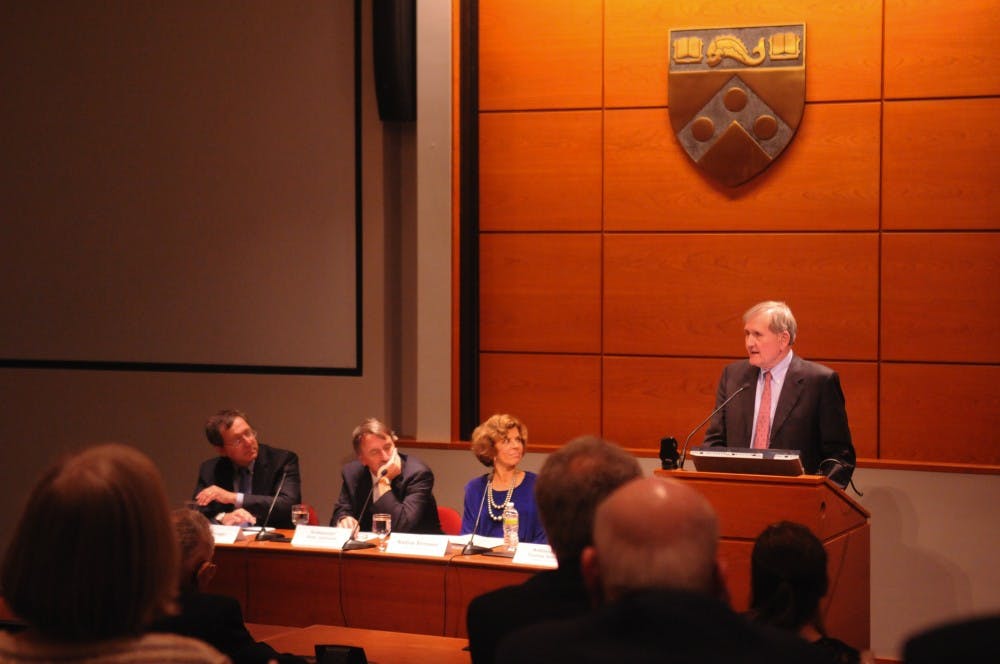As Penn marked the 11th anniversary of Sept. 11, the Law School launched a forum to foster discussion about national security issues.
Yesterday, Penn Law’s new Center for Ethics and the Rule of Law officially opened with a panel discussion about ethics and modern warfare.
According to the Center Director Claire Finkelstein, the Center is “all about reconciling the need for strong national security in the wake of the 9/11 attacks with the idea of the rule of law — that the United States is a society governed by law, not men.”
“It’s about promoting both aims, not about limiting either one of them,” she added.
Finkelstein, a Penn Law professor, previously worked with issues of ethics and national security within Penn Law’s Institute of Law and Philosophy, where she had served as co-director. In that position, however, she said she saw a need for an independent center that would specifically cover national security issues.
Finkelstein said the Center is committed to respecting the ethical standards that have become part of the country’s cultural tradition and legal history. These standards are quickly being challenged because of evolving technology and the radically changing environment of warfare.
“These changes strain our understanding of the rule of law to the breaking point,” Finkelstein said.
The Center will grapple with issues such as how to cope with enemies who are non-state actors, how to justify the lack of symmetrical risk in warfare in an age when precision weapons are becoming more common and how to tackle cyber threats.
The provider of seed funding for the Center’s first three years, Bill Craven, is also a member of the advisory board. He is the founder of Federal Systems, a private investment company which serves the intelligence and defense industries.
Craven said that as a practitioner in these industries, “You harbor certain questions in your mind. ‘Is this legal? Is this ethical? What’s the morality here?’ Many people in the community here struggle with questions of ethics and the rule of law.”
Several people who are personally involved with the Center commented on its distinctive nature as a non-partisan and interdisciplinary forum.
Kevin Govern, an advisory board member and a professor of law at Ave Maria School of Law in Florida, said that these two qualities make the Center “unlike any other organization.” He noted that think tanks tend to have a partisan affiliation or will have a sponsor with a particular viewpoint, while interest groups are often comprised of members from the same type of occupational background.
Craven agreed that the interdisciplinary nature of the Center will help it achieve recognition from policy makers.
“I saw that Claire was reaching out into the military community.… She actually went up to West Point and held a meeting up there to talk to future officers,” he said. “To me, there was a great air of practicality to it.”
The Center aims to involve not only law students, but also graduate and undergraduate students studying philosophy and political science. For example, Chris Melenovsky, a doctoral student in the Philosophy Department and the academic administrator of the Center, became interested in legal philosophy early in his doctoral program.
Melenovsky was enthused by the Center’s future prospects and relevance to current national discussions.
“We’ll pick an issue that seems like people might start talking about it, and by the time the conference happens, the issue has kind of become a big issue,” he said.
While the Center is currently only focused on national security, it may later broaden its scope to include other areas where ethics and the law are concerned, such as in medical ethics. In the meantime, the center will attempt to build up its funds as well as its reputation.
“I’m positive that we can do just that because of the success that we’ve seen with our previous conferences,” Melenovsky said.



